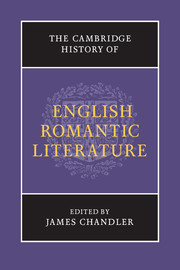Book contents
- Frontmatter
- Introduction
- Part I The Ends of Enlightenment
- Part II Geographies: The Scenes of Literary Life
- Part III Histories: Writing in the New Movements
- 15 Rebellion, revolution, reform: the transit of the intellectuals
- 16 Changes in the world of publishing
- 17 The new poetries
- 18 Romanticism and poetic autonomy
- 19 Transformations of the novel – I
- 20 Transformations of the novel – II
- 21 Theatre, performance and urban spectacle
- 22 The epigenesis of genre: new forms from old
- 23 The literature of the new sciences
- 24 The making of child readers
- Part IV The Ends of Romanticism
- Chronology
- Bibliographies
- Index
- 1 A New Pocket Map of the Cities of London and Westminster; with the Borough of Southwark, Comprehending the new Buildings and other Alterations, 3rd edn (London: William Faden, 1790).">
- References
15 - Rebellion, revolution, reform: the transit of the intellectuals
from Part III - Histories: Writing in the New Movements
Published online by Cambridge University Press: 28 May 2009
- Frontmatter
- Introduction
- Part I The Ends of Enlightenment
- Part II Geographies: The Scenes of Literary Life
- Part III Histories: Writing in the New Movements
- 15 Rebellion, revolution, reform: the transit of the intellectuals
- 16 Changes in the world of publishing
- 17 The new poetries
- 18 Romanticism and poetic autonomy
- 19 Transformations of the novel – I
- 20 Transformations of the novel – II
- 21 Theatre, performance and urban spectacle
- 22 The epigenesis of genre: new forms from old
- 23 The literature of the new sciences
- 24 The making of child readers
- Part IV The Ends of Romanticism
- Chronology
- Bibliographies
- Index
- 1 A New Pocket Map of the Cities of London and Westminster; with the Borough of Southwark, Comprehending the new Buildings and other Alterations, 3rd edn (London: William Faden, 1790).">
- References
Summary
In late 1788 Louis XVI called the Estates General to meet in response to increasing agitation for reform. On 8 January 1789 Thomas Jefferson, observing the heightened political tensions, described the events and gave his benign opinion of their expected outcome: ‘from the natural progress of things [the French] must press forward to the establishment of a constitution which shall assure to them a good degree of liberty’. The author of the American Declaration of Independence suggests as well in the same letter from Paris that the American events of 1775–83 had provided the energy for this ‘illumination of the public mind as to the rights of the nation’: ‘Tho’ celebrated writers of this and other countries had already sketched good principles on the subject of government, yet the American war seems first to have awakened the thinking part of this nation in general from the sleep of despotism.’ The American War had also, though Jefferson didn’t state it, been a major source of the ongoing financial crisis of the French state. Jefferson’s letter was addressed to the distinguished London Dissenting Minister, Richard Price, an intellectual colleague in the culture of Enlightenment liberality. On 4 November 1789, Price delivered a sermon to the London Revolution Society to mark the centenary of the 1688 ‘Glorious Revolution’, in which he claimed the kinship of parliamentary sovereignty between the 1688 Settlement and the recent occurrences in both America and France: ‘After sharing in the benefits of One Revolution, I have been spared to be a witness to two other Revolutions, both glorious.’
Keywords
- Type
- Chapter
- Information
- The Cambridge History of English Romantic Literature , pp. 355 - 376Publisher: Cambridge University PressPrint publication year: 2009

